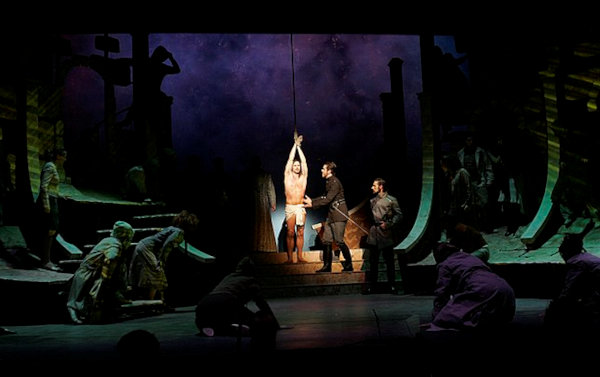The Easter Sunday broadcast of Superstar “has more implications than what you may think.” says this reviewer.
CRAIG KENNET MILLER
Discipleship Ministries
The Easter Sunday broadcast of Jesus Christ Superstar Live with John Legend has more implications than what you may think. What NBC might not realize, is that Jesus Christ Superstar was a defining moment in the spiritual life of Boomers, those born from 1946 to 1964. It also was part of a movement that completely changed what we know as the church in America.
Before the rock opera was staged on Broadway in October of 1971, it was a concept album written by Andrew Lloyd Weber and Tim Rice that was released in September of 1970. The 2-record set was packaged in a brown cardboard box containing 2 records and a 28-page booklet with all the lyrics. Amazingly it became the top-selling LP on the Billboard Pop Chart of 1971, even outselling the hugely popular Tapestry by Carole King.
Boomers, whose oldest members were 25-years-old, were captured by its irreverent look at Jesus and the people who surrounded him. Judas challenged Jesus, wondering if his fame had gotten to his head in “Superstar.” Mary Magdalene professed her love for him in the haunting song, “I Don’t Know How to Love Him”, that was played regularly on the radio. In the “Last Supper” the disciples were portrayed as clueless drunkards who looked forward to writing the gospels so people would remember them after they died. Pilate got somewhat of a pass in “Pilate’s Dream,” when he wonders why he gets all the blame for the crucifixion.
But it was Jesus, this newly discovered Jesus, that got Boomer’s attention. This was not the mild, dispassionate Jesus they had heard about in their churches growing up. This was the human Jesus – angry, desperate, questioning authority, overwhelmed by the needs of people – who in the end gave his life for humanity.
The questions for today’s boomers – will they like their parents be scandalized by their children’s and grandchildren’s version of Jesus?
Boomers were also captured by the music – blaring electric guitars, incessant drums and percussion, the sounds of the new Moog synthesizer, and singing that personified the sounds of rock that boomers loved.
It so happens that Jesus Christ Superstar hit just as boomers were turning away from the counter-cultural movement of the 1960s and turning on to Jesus as the Jesus movement burst on the scene. Even Time Magazine’s June 1971 Cover “The Jesus Revolution,” chronicled how boomers were redefining what it meant to be a follower of Jesus.
What was most perplexing to their parents was this new found love for Jesus did not translate into a love for the church. Instead of coming back to their parent’s congregations, most who featured three-point sermons on the history of the faith, classical music, unending meetings, and hymns accompanied by organ music; boomers created their own churches that featured rock’n’roll music, wrote their own songs that became the genesis of what we now call contemporary music, and preached in jeans.
The mega-church movement, Christian contemporary music, and even the rise of Pentecostal churches owe much of their growth and influence to the Jesus Movement and the Jesus Christ Superstar soundtrack that gave voice to a passionate Jesus whose call to love still changes lives.
The questions for today’s boomers are these – will they like their parents be scandalized by their children’s and grandchildren’s version of Jesus? Will they make room for a new voice that is emerging from the youngest among us, Generation Z (born since 200)? Will they be open to a new kind of hospitality that radically welcomes everyone regardless of race, national origin, gender, and sexual preference? Will they welcome a generation whose understanding of marriage and parenting is shaped by the fact that around 40% of them were born outside of marriage? Will they be open to a church that resides online and outside of church buildings? Will they be open to a generation where Non-Hispanic Whites make up less than 50% of their population?
Like generations before them, Boomers, who now hold the key positions of power in the church, will need to make a choice. Will they make decisions that create space for the youngest among us or will they build walls that will lead young people to create their own communities of faith free from generational expectations but open to the leading of the spirit? For the reality is this – while church institutions rise and fall, Jesus always finds a way to connect with each new generation, for his message is for all time.
Listen to the new podcast by Miller and Chris Wilterdink on The New Youth Boom, Pt. 1: Voice .
Last Updated on November 1, 2023

